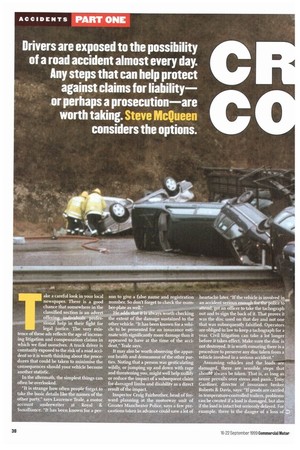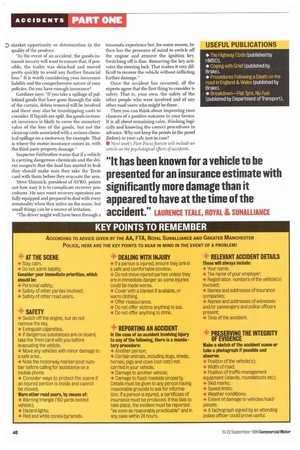Drivers are exposed to the possibility of a road accident almost every day.
Page 42

Page 44

If you've noticed an error in this article please click here to report it so we can fix it.
Any steps that can help protect
against claims for liability—
or perhaps a prosecution—are worth taking. Steve McQueen considers the options.
Take a careful look in your local newspaper. There is a good chance that somewhere in the classified section is an advert offering individuals professional help in their fight for legal justice. The very existence of these ads reflects the age of increasing litigation and compensation claims in which we find ourselves. A truck driver is constantly exposed to the risk of a road accident so it is worth thinking about the procedures that could be taken to minimise the consequences should your vehicle become another statistic.
In the aftermath, the simplest things can often be overlooked.
It is strange how often people forget to take the basic details like the names of the other party," says Laurence Teale, a motor account underwriter at Royal & Sunalliance. "It has been known for a per son to give a false name and registration number. So don't forget to check the number-plate as well."
He adds that it is always worth checking the extent of the damage sustained to the other vehicle. "It has been known for a vehicle to be presented for an insurance estimate with significantly more damage than it appeared to have at the time of the accident," Teale says.
It may also be worth observing the apparent health and demeanour of the other parties. Noting that a person was gesticulating wildly, or jumping up and down with rage and threatening you, might well help nullify or reduce the impact of a subsequent claim for damaged limbs and disability as a direct result of the impact.
Inspector Craig Fairbrother, head of forward planning at the motorway unit of Greater Manchester Police, says a few precautions taken in advance could save a lot of
heartache later. "If the vehicle is involved in an accident serious enough for the police to attend, get an officer to take the tachograph out and to sign the back of it. That proves it was the disc used on that day and not one that was subsequently falsified. Operators are obliged in law to keep a tachograph for a year. Civil litigation can take a lot longer before it takes effect. Make sure the disc is not destroyed. It is worth ensuring there is a procedure to preserve any disc taken from vehicle involved in a serious accident."
Assuming vehicles and the loads are damaged, there are sensible steps that should always be taken. That is, as long as sense prevails over stress and panic. Tony Gardiner, director of insurance broker Roberts & Davis, says: "If goods are carried in temperature-controlled trailers, problems can be created if a load is damaged, but also if the load is intact but seriously delayed. For example, there is the danger of a loss of market opportunity or deterioration in the quality of the produce.
-In the event of an accident, the goods-intransit insurer will want to ensure that, if possible, the trailer was detached and moved pretty quickly to avoid any further financial loss." It is worth considering your insurance liability and the comprehensive nature of your policies. Do you have enough insurance?
Gardiner says: "If you take a spillage of palletised goods that have gone through the side of the curtain, debris removal will be involved and there may also be transhipping costs to consider. If liquids are spilt, the goods-in-transit insurance is likely to cover the monetary value of the loss of the goods, but not the clean-up costs associated with a serious chemical spillage on a motorway, for example. That is where the motor insurance comes in, with the third party property damage."
Inspector Fairbrother warns that if a vehicle is carrying dangerous chemicals and the driver suspects that the load has started to leak they should make sure they take the Trem card with them before they evacuate the area.
Steve Shinnick, president of AVRO, points out how easy it is to complicate recovery procedures. He says most recovery operators are fully equipped and prepared to deal with every eventuality when they arrive on the scene, but small things can be a source of irritation.
"The driver might well have been through a traumatic experience but, for some reason, he then has the presence of mind to switch off the engine and remove the ignition key. Switching off is fine. Removing the key activates the steering lock. That makes it very difficult to recover the vehicle without inflicting further damage."
Once the accident has occurred, all the experts agree that the first thing to consider is safety. That is, your own, the safety of the other people who were involved and of any other road users who might be there.
Then you can think about improving your chances of a positive outcome in your favour. It is all about remaining calm, thinking logically and knowing the correct procedures in advance. Why not keep the points in the panel (below) in your cab, just in case?
• Next week's Fleet Focus feature will include an article on the psychological effects of accidents.










































































































